July and August were pretty great reading months. There were a few that didn’t quite hit the mark for me, but many more that did.
Project chunkster continued, helped by a July holiday in Italy with lots of train journeys. Then in August I did WiTMonth again . I still find it rewarding and it pushes me to broaden my reading.
JULY
Moby Dick, by Herman Melville
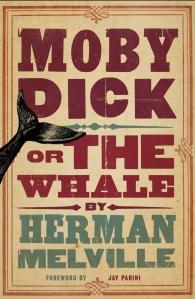
Love that cover.
What a book! I mean, what an absolutely brilliant book! And so unexpected too. This has quite a daunting reputation but really undeserved. Mostly it’s a rambling shaggy dog tale with Ishmael sharing his thoughts on life, whaling and whatever else crosses his mind.
We’re 100 pages in before Ahab even makes an appearance, and the whale doesn’t turn up until you’re near the end of the book. I’d thought the whole thing was grim pursuit, and that’s in there but it takes its time to set out the characters and their world and that pays dividends as it starts to accelerate.
At times it’s very funny and Ishmael is a wonderful narrator, not least for his habit of creating his own pseudo-academic categorisations of types of whales none of which are borne out by any kind of real science even of the time. His bromance, and frankly quite possibly outright romance, with Queequeg is nicely observed and there’s just a richness here which is really rewarding.
Oh, and Call me Ishmael isn’t the first line. There’s a whole bunch of whale-related quotes and an in-book foreword. You’re quite a few pages in before you get to Call me Ishmael. So one of the most famous first lines in literature it turns out isn’t.
Anyway, it’s genuinely brilliant. I’m sorry if you had to study it in school and that spoiled it for you because it’s just such a good book. Rather obvious trigger warning though of cruelty to animals – the scenes where they hunt and kill whales are genuinely hard reading. On the plus side it does mean that when the clash with the White Whale does arrive I was pretty sure which side I was on…
Saint Peter’s Snow, by Leo Perutz and translated by Eric Mosbacher
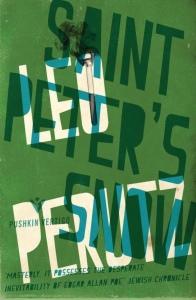
At first I thought this was translated by the translation fairy, since Pushkin rather shamefully don’t seem to have named the translator anywhere in the book. I eventually found the actual translator on their website. Anyway, that aside this is a marvelous psychological thriller about a man who may have discovered a terrible conspiracy threatening Europe or may just have suffered severe hallucinations following a traffic accident.
This becomes a clever psychological study, a proper page-turning read and quite a nice observation of the forces pushing the rise of fascism in the early 20th Century. It’s my second Perutz and like his Master of the Day of Judgment highly, highly recommended.
I was reminded of how Pushkin Press used to regularly reintroduce lost European treasures to the English speaking world. I think that mission may have moved on but it’s nice to see it still occasionally happens.
The Dark Forest, by Liu Cixin and translated by Joel Martinsen
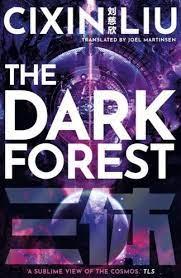
Second of Liu Cixin’s Three Body Problem trilogy, and for me now that I’ve finished probably the weakest (though that’s often the case for the middle book of trilogies).
In the first book, humanity discovers it’s not alone. Our nearest neighbouring system contains an advanced civilization and unfortunately it’s not friendly. The thing is, statistically that’s incredibly unlikely. Space is vast and there are around 100 billion stars in our galaxy alone (many more by some counts). Unless civilisations are extremely common the odds are pretty high against there being one right next door.
The Dark Forest answers that question and in the gloomiest way possible. Here, civilisations are in fact extremely common. They’re just also extremely quiet and for very, very good reason. Letting anyone know where you are is a great way to go extinct (this is also a real world theory by the way, and if correct not a good one for us as a species).
If you’re not already intimately familiar with the Fermi Paradox then this isn’t the book for you. If you are though there’s some great ideas. Characterisation isn’t a strength, but nor is it really the point of this kind of novel.
Kick the Latch, by Kathryn Scanlan
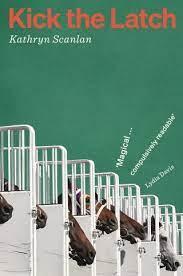
Slight change of pace and distinctly more down to earth. I had to be talked into reading this one as I’ve not only no interest in horse racing, I’m actually a bit hostile to it on animal welfare grounds. A novelisation then of the life of a racetrack trainer wasn’t an obvious read for me.
Jacqui finally pushed me over the line to read this, but honestly I’m very much last to the party and a lot of people have already talked about how great it is. And it really is. It’s spare, lean prose is absolutely captivating and brings out a life and a world (and a world in many ways more alien to me than that of Cixin Liu’s aliens). Don’t let the subject matter put you off. This is the good stuff. Here‘s Jacqui’s review and here‘s Radz Pandit’s which I also thought very good.
Last Summer in the City, by Gianfranco Calligarich and translated by Howard Curtis
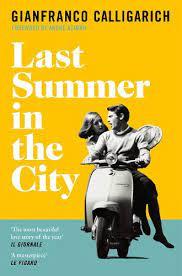
This is another one I can thank Jacqui for. It’s a lovely slice of Dolce Vita-esque Italian drama and a great summer read, if not perhaps a terribly cheery one. It’s also translated by Howard Curtis which if you know your translators is definitely a good sign.
It’s a well written story of a romance between two people both of whom are lost and perhaps too far gone to save each other. It’s melancholic, even despairing, but beautiful. I’d recommend it to anyone who likes Alfred Hayes as there’s some tonal similarities. Jacqui’s review is here (and looking at it again I see Jacqui also made that Alfred Hayes connection).
Termush, by Sven Holm and translated by Sylvia Clayton
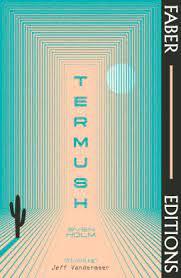
I loved this. It’s another reason why July was such a strong month. It’s a Swedish novel about the rich survivors of a nuclear war, safely ensconced in a luxury hotel. It was first published over fifty years ago, but in its examination of 1%ers trying to opt-out of the end of the world it’s sadly surprisingly relevant.
There’s a surreality to the situation – the hotel management taking care of guests who’ve paid for a package to keep them safe while billions die. What next though once the apocalypse has happened? What sense does this transaction make when there’s no longer an economic system underpinning it? And what happens when other survivors who didn’t pay turn up to this bolthole asking for help?
Jacqui’s review here is excellent (it’s clearly link to Jacqui week for me). While this is technically SF it’s very much about people and situation rather than concept and would make a very good autumn/winter read.
Ten Planets, by Yuri Herrera and translated by Lisa Dillmann
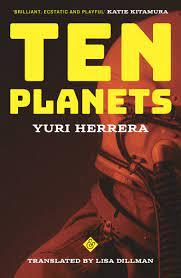
Yuri Herrera is one of my favorite authors and Lisa Dillmann is a hugely talented translator (and well done And Other Stories for putting her name on the cover). All the more of a shame then that I really didn’t take to this.
Basically it’s a Borgesian short story collection, using fantastical elements to play games with language, character and situation. Grant makes an interesting comparison to Stanislaw Lem here which also makes sense to me.
Unfortunately I just found it slim stuff. I’ll still pick up Herrera’s next with interest and enthusiasm, but for me clearly he’s a novelist and essayist rather than short story writer.
AUGUST
The Twilight Zone, by Nona Fernandez and translated by Natasha Wimmer
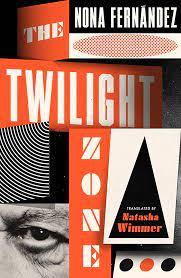
I loved Nona Fernández’ novel Space Invaders so no great surprise I loved this too. It’s a sort of autofiction but about someone other than the author, here a torturer who became a whistleblower of the atrocities behind Argentina’s disappearances.
It’s a difficult, powerful and angry read but for me was quite breathtaking. It lifts the veil on horror, not the horror of ghosts and monsters and all that but the real horror of state-sponsored murder and systematised brutality.
Not an easy read, but a rewarding one and as Grant says in his insightful review here it avoids the trap of becoming merely accusatory. Instead it tries to understand, both the times and the people involved. Superb.
The Dry Heart, by Natalia Ginzburg and translated by Francis Frenaye
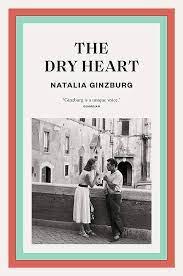
I’ve been wanting to read Ginzburg for a while now and this seemed a good way in, partly as it’s quite slim but also because it has a tremendous opening. It’s an examination of why the narrator murdered her husband (she does it on the first page, it’s not a spoiler), and through that of her life and their relationship.
It’s a sparsely written novel of a woman trapped by her times and society who escapes through marriage only to find herself trapped by that too. It’s horribly sad. Were it true it’s easy to imagine how the narrator would be demonised by the press, and to be fair she does commit murder, but the choices available to her never led to anywhere worth going.
Our Lady of the Nile, by Scholastique Mukasonga and translated by Melanie Mauthner
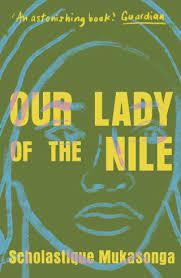
This is why I like WiTMonth. I’d had this tale of tensions at a private girl’s school in 1990s Rwanda for a while but hadn’t got round to reading it. My mistake because it’s very well written and has that marvelous thing where you take an enclosed environment – a hotel, a school, a boarding house – and it becomes a microcosm of wider society.
Our Lady explores colonial legacies, the value placed on women, and class and ethnic tensions. It’s has memorable characters and a good exploration of how a few strong-willed chancers can drive people to terrible outcomes. Stu wrote a bit more about this here.
Celestial Bodies, by Jokha Alharthi and translated by Marilyn Booth
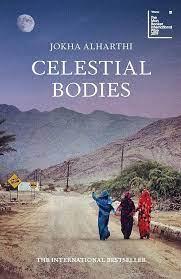
This wasn’t my book but the fault was mine rather than Jokha Alharthi’s. It’s a multi-generational family saga and that’s simply never been a genre that interests me, even when as here it’s well done.
We follow three generations of Omani women seeing both the changing role of women in Omani society and the changes to Oman itself. I’ve actually been to Oman a couple of times by the way and it’s lovely and very chill, so even if this wasn’t quite me I do still recommend the country.
Grant wrote about this here and his reaction was very similar to mine. It’s skilled and to use Grant’s phrase there’s a great deal of craft, but it’s telling a family’s story and that’s just not something I’ve ever been that interested in. A good book then that deserved the attention it received, but not my book.
Ms Ice Sandwich, by Mieko Kawakami and translated by Louise Heal Kawai
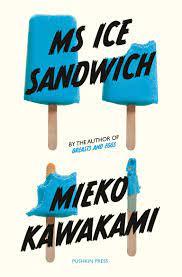
I absolutely loved Mieko Kawakami’s Heaven and I felt like something bite-size after the saga that is Celestial Bodies, so this Kawakami novella felt just right. It’s the story of a boy who has a crush on a woman who works at a sandwich counter, and so it’s a story about growing up.
The boy has a girl he’s friends with but he misses her signals that maybe she’d like more. His grandmother is bedridden and he’s coming to terms with the idea of losing her soon. The sandwich woman is safe in all this because in a sense she’s not real, she’s a dream he’s built around a woman he knows nothing about, but underneath his idea of her there is of course an actual person.
It’s much slighter than Heaven and less memorable, but I enjoyed it and I thought the narrative voice captured early adolescence well. Tony was perhaps a little less taken in his review here. Not prime Kawakami then, but worth a read.
The Forgery, by Ave Barrera and translated by Ellen Jones and Robin Myers
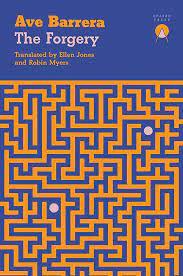
My last read in August and an absolute delight. It’s a tale of an artist trapped by debt into forgery and then literally trapped by his rich but very dodgy patron. It’s huge fun, from a cliffhanger opening to the series of unlikely yet somehow inevitable events which draw our hero Jose in far, far over his head.
Barrera writes well on art and architecture, both of which are central to this, but it’s the characters that make it sing. Grant writes well about this here and I think it has a good chance of making my end of year list.
And that was my Summer reading! Not bad and nor was Autumn, but that’s my next post…
